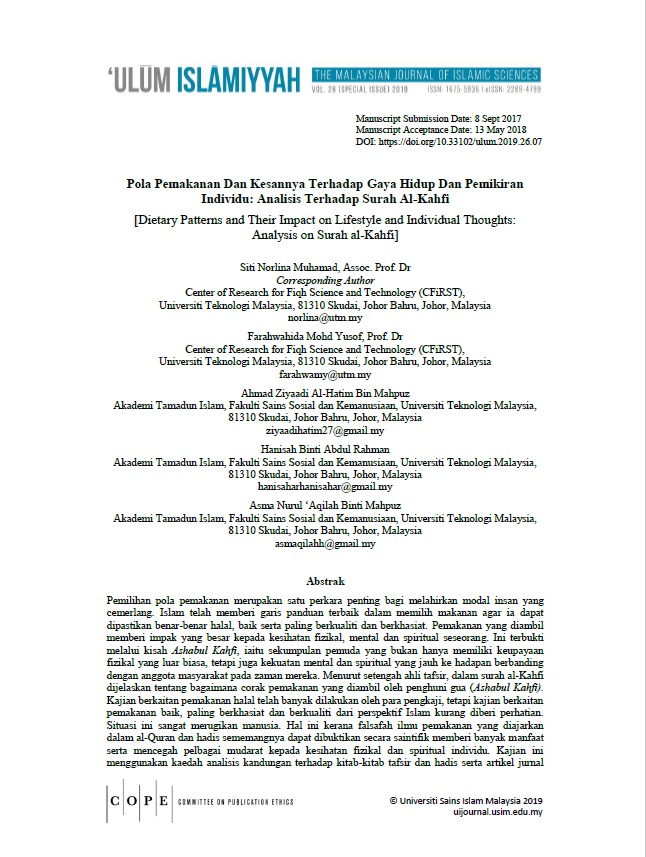Pola Pemakanan Dan Kesannya Terhadap Gaya Hidup Dan Pemikiran Individu: Analisis Terhadap Surah Al-Kahfi
[Dietary Patterns and Their Impact on Lifestyle and Individual Thoughts: Analysis on Surah al-Kahfi]
DOI:
https://doi.org/10.33102/uij.vol26no.115Keywords:
pola pemakanan, gaya hidup, pemikiran, surah al-Kahfi, diet, lifestyle, mindAbstract
The choice of diet is important in creating an excellent human capital. Islam has given the best guideline in choosing food so that it can be truly halal, good (thoyyiban), most quality and nutritious. Diet has a great impact on individual’s physical, mental and spiritual health. This is illustrated through cave dwellers (Ashabul Kahfi), a group of young people who have exceptional physical capabilities as well as mental and spiritual strengths that are far ahead of any members of their society. According to some Tafseer scholars, diet pattern of the cave dwellers is explained in surah al-Kahfi. Study on halal diet has been widely practiced by researchers, but study on good, most nutritious and most quality diet from an Islamic perspective are still inadequate. This situation is a disadvantage to the human being. This is because the philosophy of nutritional knowledge taught in the Quran and hadith is scientifically proven to bring benefits and prevent harm to individual physical and spiritual health. This study uses content analysis method where analysis is conducted on books of Tafseer and hadith as well as journal articles that discuss the diet styles of today's society and its impact on spiritual and physical health. The results show that issues on food quality and dietary patterns greatly affect the spiritual and physical strength of an individual.
Abstrak
Pemilihan pola pemakanan merupakan satu perkara penting bagi melahirkan modal insan yang cemerlang. Islam telah memberi garis panduan terbaik dalam memilih makanan agar ia dapat dipastikan benar-benar halal, baik serta paling berkualiti dan berkhasiat. Pemakanan yang diambil memberi impak yang besar kepada kesihatan fizikal, mental dan spiritual seseorang. Ini terbukti melalui kisah Ashabul Kahfi, iaitu sekumpulan pemuda yang bukan hanya memiliki keupayaan fizikal yang luar biasa, tetapi juga kekuatan mental dan spiritual yang jauh ke hadapan berbanding dengan anggota masyarakat pada zaman mereka. Menurut setengah ahli tafsir, dalam surah al-Kahfi dijelaskan tentang bagaimana corak pemakanan yang diambil oleh penghuni gua (Ashabul Kahfi). Kajian berkaitan pemakanan halal telah banyak dilakukan oleh para pengkaji, tetapi kajian berkaitan pemakanan baik, paling berkhasiat dan berkualiti dari perspektif Islam kurang diberi perhatian. Situasi ini sangat merugikan manusia. Hal ini kerana falsafah ilmu pemakanan yang diajarkan dalam al-Quran dan hadis sememangnya dapat dibuktikan secara saintifik memberi banyak manfaat serta mencegah pelbagai mudarat kepada kesihatan fizikal dan spiritual individu. Kajian ini menggunakan kaedah analisis kandungan terhadap kitab-kitab tafsir dan hadis serta artikel jurnal yang membincangkan tentang gaya pemakanan masyarakat hari ini dan kesannya terhadap tahap kesihatan spiritual dan fizikal mereka. Hasil kajian menunjukkan bahawa beberapa isu berkaitan pemakanan seperti kualiti makanan dan pola pemakanan sangat mempengaruhi kekuatan spiritual dan fizikal seseorang individu.
Downloads
References
Bennett, C., & Blissett, J. (2017). Parental monitoring may protect impulsive children from overeating. Pediatric Obesity. https://doi.org/10.1111/ijpo.12159
Byrne, S. M., Fursland, A., Allen, K. L., & Watson, H. (2011). The effectiveness of enhanced cognitive behavioural therapy for eating disorders: An open trial. Behaviour Research and Therapy. https://doi.org/10.1016/j.brat.2011.01.006
Davis, C., Patte, K., Levitan, R., Reid, C., Tweed, S., & Curtis, C. (2007). From motivation to behaviour: A model of reward sensitivity, overeating, and food preferences in the risk profile for obesity. Appetite, 48(1), 12-19.
Davis, C., Strachan, S., & Berkson, M. (2004). Sensitivity to reward: Implications for overeating and overweight. Appetite, 42(2), 131-138.
Ganasegeran, K., Al-Dubai, S. A. R., Qureshi, A. M., Al-Abed, A. A. A. A., Am, R., & Aljunid, S. M. (2012). Social and psychological factors affecting eating habits among university students in a Malaysian medical school: A cross-sectional study. Nutrition Journal. https://doi.org/10.1186/1475-2891-11-48
Gidugu, V., & Jacobs, M. L. (2018). Empowering individuals with mental illness to develop healthy eating habits through mindful eating: results of a program evaluation. Psychology, Health & Medicine. https://doi.org/10.1080/13548506.2018.1516295
HAMKA. 1985. Tafsir Al-Azhar. Singapura: Pustaka Nasional.
John A. Romas, Manoj Sharma. 2017. Chapter 7: Eating Behavior for Healthy Lifestyles. Practical Stress Management. 7th Edition. Pages 131-154. Academic Press
Korinth, A., Schiess, S., & Westenhoefer, J. (2010). Eating behaviour and eating disorders in students of nutrition sciences. Public Health Nutrition. https://doi.org/10.1017/S1368980009005709
Nasution, S. 2003. Metode Penelitian Naturalistik Kualitatif. Bandung: Tarsito
Norkumala Awang. 2013. Pemakanan Yang Sihat Menurut Perspektif Islam. Kuala Lumpur; Penerbit IKIM
Seiverling, L., Williams, K. E., Hendy, H. M., Adams, W., Yusupova, S., & Kaczor, A. (2018). Sensory Eating Problems Scale (SEPS) for children: Psychometrics and associations with mealtime problems behaviors. Appetite. doi:10.1016/j.appet.2018.11.008
Sayyid Qutb. 2000. Tafsir fi Zilal al-Quran. Yusof Zaky Yaacob (terj.): Kota Bharu: Pustaka Aman Press.

Downloads
Published
How to Cite
Issue
Section
License
If the article is accepted for publication, the copyright of this article will be vested to author(s) and granted the journal right of first publication with the work simultaneously licensed under the Creative Commons Attribution-NonCommercial 4.0 International License, unless otherwise stated. Anyone may reproduce, distribute, translate and create derivative works of this article (for both commercial and non-commercial purposes), subject to full attribution to the original publication and authors. The full terms of this licence may be seen at https://creativecommons.org/licenses/by-nc/4.0/.






